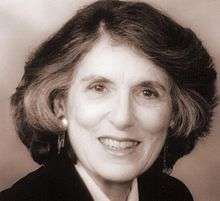Dana Ulery
| Dana L. Ulery | |
|---|---|
 | |
| Born |
January 2, 1938 East St. Louis, Missouri, USA |
| Nationality | United States |
| Fields | Computer science |
| Institutions | United States Army Research Laboratory, Georgia Institute of Technology, University of Delaware, DuPont, Cairo University, American University in Cairo, Jet Propulsion Laboratory |
| Education | BA, Grinnell College, 1959; MS, University of Delaware, 1972; PhD, University of Delaware, 1975. |
| Alma mater | Grinnell College, University of Delaware |
| Thesis | Computer science's reincarnation of finite differences (1976) |
Dana Ulery (born January 2, 1938) is an American computer scientist and pioneer in scientific computing applications. She began her career in 1961 as the first woman engineer at the NASA Jet Propulsion Laboratory (Pasadena, CA), designing and developing algorithms to model NASA’s Deep Space Network capabilities [1] and automating real-time tracking systems for the Ranger and Mariner space missions using a North American Aviation Recomp II, 40-bit word size computer.[2] Over the course of her career, she has held positions as an applied science and technology researcher and manager in industry, academia, and government.[3] In 2007, she retired from her position as Chief Scientist of the Computational and Information Sciences Directorate at the United States Army Research Laboratory(ARL).
Ulery was among the first group of female managers at the US Army Research Laboratory. In these positions, she was also appointed Chair of the US Army Materiel Command Knowledge Management Council,[4] and in 2002 was awarded the Army Knowledge Award for Best Transformation Initiative. She is listed in American Men and Women of Science, Who’s Who of American Women, Who’s Who in the East, Who’s Who in the World, and Who’s Who in America.
Ulery received her BA from Grinnell College in 1959, with a double major in English Literature and Mathematics.[4] She earned her MS and PhD in Computer Science from the University of Delaware, in 1972 and 1975 respectively.[3] In 1976, she accepted visiting faculty appointments at Cairo University in Egypt and the American University in Cairo. On her return to the U.S., she joined the Engineering Services Division of the DuPont Company, where she worked as a computer scientist and technical manager.[3] In the early 1980s, Ulery led initiatives to develop and deploy enterprise application systems to evaluate and control product quality at DuPont sites.[5] For these achievements she was awarded the DuPont Engineering Award for Leadership of Corporate Quality Computer Systems. Ulery also played an active role in establishment of EDI standards, international standards for electronically exchanging technical information used by business and government. She initiated and led multidisciplinary programs at ARL to advance research in multi-source information fusion and situational understanding applied to non-traditional battle environments and homeland defense.[6]
In the 1990s, Ulery served for many years as Pan American Delegate to the United Nations Electronic Data Interchange for Administration, Commerce, and Trade (UN/EDIFACT).[3] She was Chair of the UN/EDIFACT Multimedia Objects Working Group and Chair of the UN/EDIFACT Product Data Working Group, leading early international development of standards for electronic commerce.
Publications
- Ulery, Dana L (1972). Lineal a language-oriented system for solving problems in linear algebra. (M.S.). University of Delaware. OCLC 3716008.
- Ulery, Dana L (1976). Computer science's reincarnation of finite differences (Ph.D.). University of Delaware. OCLC 33892757.
References
- ↑ S. L. Kresser and R. J. Sippel (15 October 1962). "Publications of the Jet Propulsion Laboratory July 1961 through June 1962" (PDF) (Bibliography No. 39-3). Pasadena, California: Jet Propulsion Laboratory: 47. Retrieved 16 October 2013.
U01 Evaluation of Goldstone Polar-Mount Antenna Systematic Errors from Star Tracks, Ulery, D., Fearey, J., Technical Memorandum 33-45, May 5, 1961 (Unclassified)
- ↑ Autonetics Industrial Products (1963). RECOMP II Operating Manual (PDF). Anaheim, California: Autonetics, Data Systems Division.
- 1 2 3 4 "Dana Lynn Ulery". American Men & Women of Science: A Biographical Directory of Today's Leaders in Physical, Biological, and Related Sciences. 2008.
- 1 2 Ulery, Dana L. (January–February 2002). "Building Knowledge Ecosystems for Enabling Army Transformation" (PDF). Army AL&T: 6–7. Retrieved 16 October 2013.
- ↑ Marquardt, Donald W.; Ulery, Dana L. (1991). Product Quality Management. Wilmington,DE: E.I. du Pont de Nemours, Quality Management & Technology Center. OCLC 29224881.
- ↑ U.S. Army Research Laboratory (October 2006). ARL/ARO Core Broad Agency Announcement for Basic and Applied Scientific Research for Fiscal Years 2007 through 2011 (PDF). Research Triangle Park, NC: U.S. Army RDECOM Acquisition Center, RTP Contracting Division. Retrieved 16 October 2013.
External links
- Works by Dana Ulery in Worldcat libraries
- US Army Research Laboratory
- NASA Jet Propulsion Laboratory
- Electronic Commerce standards